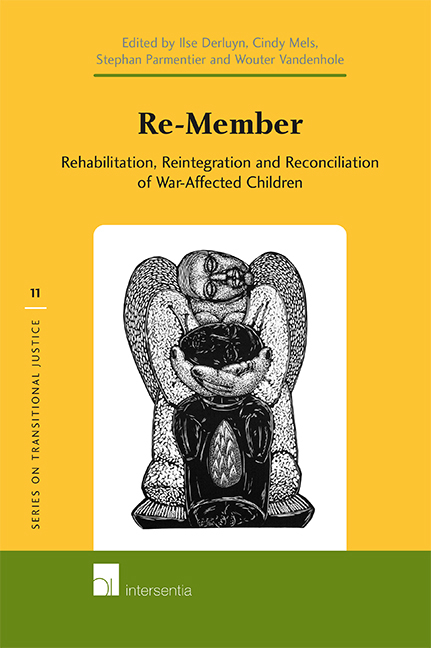Book contents
- Frontmatter
- Preface
- Foreword
- Contents
- Introduction: Children Affected by Armed Conflict at the Intersection of Three Fields of Study
- PART I SETTING THE SCENE: THREE DISCIPLINARY PERSPECTIVES
- PART II LESSONS LEARNT FROM CURRENT PRACTICES AND APPROACHES
- PART III EXPLORING RESOURCES THROUGH EMPIRICAL RESEARCH
- PART IV LOOKING BACK, REACHING FORWARD
- About the Editors
- About the Authors
9 - No Return Home: The (Non-)Reintegration of Youth Ex-Combatants in Sierra Leone as a Challenge to the Contextualisation of DDR and Transitional Justice
Published online by Cambridge University Press: 20 January 2021
- Frontmatter
- Preface
- Foreword
- Contents
- Introduction: Children Affected by Armed Conflict at the Intersection of Three Fields of Study
- PART I SETTING THE SCENE: THREE DISCIPLINARY PERSPECTIVES
- PART II LESSONS LEARNT FROM CURRENT PRACTICES AND APPROACHES
- PART III EXPLORING RESOURCES THROUGH EMPIRICAL RESEARCH
- PART IV LOOKING BACK, REACHING FORWARD
- About the Editors
- About the Authors
Summary
RESEARCH QUESTION AND METHODOLOGY
In 2003, while working with the Truth and Reconciliation Commission (hereafter the TRC or the Commission), I once had an interview with a former child soldier, together with one of the Commission's psychosocial councillors. A 24-year-old adult at the time we met, the boy had been abducted by the Revolutionary United Front (RUF) around the age of twelve or thirteen and stayed with them for about ten years. Through his bravery and “good” behaviour he rapidly climbed up to the level of “captain” and later “colonel”, which included him being allowed the use of a truck (meaning he did not have to walk) and the command of a “Small Boys Unit” (SBU). During the interview, he explained why and how he was feared by the others, how he had all the food and money he wanted, how he could order his boys to pass him any looted item he preferred, the crimes and abuses they committed when attacking villages, how he was given the oversight of some mining activity, what sophisticated materials they had at their disposal during combat, how he escaped when captured by another armed group, etc. The whole interview sounded like someone describing the role he played in a “Rambo” film. He seemed very proud of his acts and the status he acquired. His main problem was with his current status in the community where he had decided to settle down after demobilisation (instead of returning home). He seemed to feel somehow relieved about the fact that people were not aware of his acts during the war (though they knew he had been a child combatant) and he had even become an appreciated solo singer in the church choir. On the other hand, he may have had some feelings of guilt, since he wanted to come out and apologise publicly for what he had done. But his (former combatant) friends discouraged him from doing so. Coming out and laying down his old status would lose him old friends. In addition, he would run the risk of being rejected by his new community and losing his new status as well.This prevented him from showing up for the TRC's reconciliation hearing.
Information
- Type
- Chapter
- Information
- Re-MemberRehabilitation, Reintegration and Reconciliation of War-Affected Children, pp. 215 - 242Publisher: IntersentiaPrint publication year: 2012
Accessibility standard: Unknown
Why this information is here
This section outlines the accessibility features of this content - including support for screen readers, full keyboard navigation and high-contrast display options. This may not be relevant for you.Accessibility Information
- 7
- Cited by
